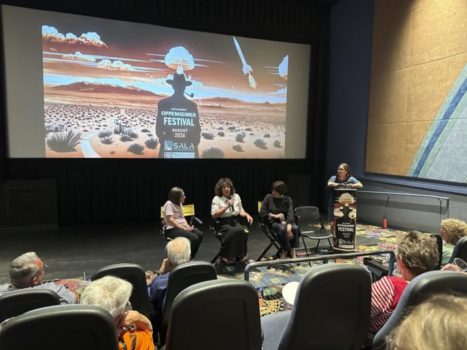(Headline USA) It was the summer of 1945 when the United States dropped atomic bombs on Japan, killing thousands of people as waves of destructive energy obliterated two cites. It was a decisive move that helped bring about the end of World War II, but survivors and the generations that followed were left to grapple with sickness from radiation exposure.
At the time, U.S. President Harry Truman called it “the greatest scientific gamble in history,” saying the rain of ruin from the air would usher in a new concept of force and power. What he didn’t mention was that the federal government had already tested this new force on U.S. soil.
Just weeks earlier in southern New Mexico, the early morning sky erupted with an incredible flash of light. Windows rattled hundreds of miles away and a trail of fallout stretched to the East Coast.
Ash from the Trinity Test rained down for days. Children played in it, thinking it was snow. It covered fresh laundry that was hanging out to dry. It contaminated crops, singed livestock and found its way into cisterns used for drinking water.
The story of New Mexico’s downwinders — the survivors of the world’s first atomic blast and those who helped mine the uranium needed for the nation’s arsenal — is little known. But that’s changing as the documentary “First We Bombed New Mexico” racks up awards from film festivals across the United States.
It’s now screening in the northern New Mexico community of Los Alamos as part of the Oppenheimer Film Festival. It marks a rare chance for the once secret city that has long celebrated the scientific discoveries of J. Robert Oppenheimer — the father of the atomic bomb — to contemplate another more painful piece of the nation’s nuclear legacy.
The film, directed and produced by Lois Lipman, highlights the displacement of Hispanic ranching families when the Manhattan Project took over the Pajarito Plateau in the early 1940s, the lives forever altered in the Tularosa Basin where the bomb was detonated and the Native American miners who were never warned about the health risks of working in the uranium industry.
Their heart-wrenching stories woven together with the testimony of professors and doctors spurred tears in Los Alamos, as they have in Austin, Texas, Annapolis, Maryland, and every other city where the film has been screened.
Andi Kron, a long-time Los Alamos resident, was in awe of the cinematography but also horrified as she learned more.
“Just unbelievable,” she said, noting that even people who have been involved in studying different aspects of the Trinity Test decades later remain unaware of the downwinders’ plight.
Lipman and others hope to distribute the documentary more widely as part of an awareness campaign as downwinders push for the federal Radiation Exposure Compensation Act to be reauthorized and expanded to include more people who have been exposed by nuclear weapons work carried out by the federal government.
Over the past 10 years, Lipman has followed Tularosa Basin Downwinders Consortium co-founder Tina Cordova as she has appeared before Congress, held countless town halls and shared meals and prayers with community members.
Lipman expressed her frustrations during the premiere in Los Alamos, noting that despite testimony about the injustices that followed the Trinity Test, the federal government has yet to acknowledge its failures in recognizing the damage that was done nearly 80 years ago.
As the film notes, there were about a half-million people living within a 150-mile radius of the blast. The area was neither remote nor unpopulated, despite government claims that no one lived there and no one was harmed.
Adapted from reporting by the Associated Press

